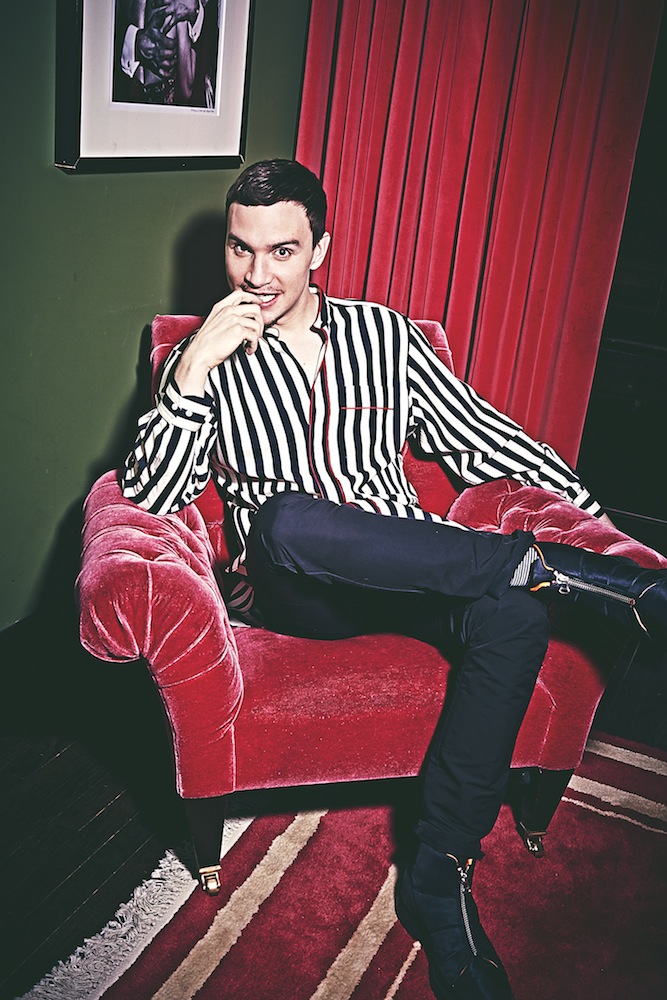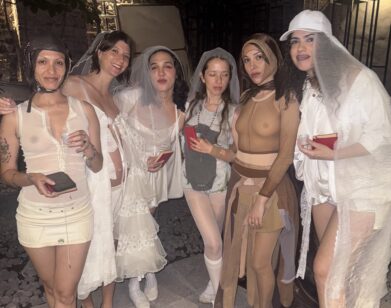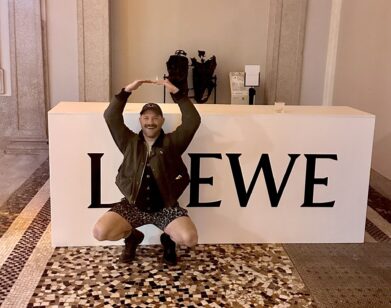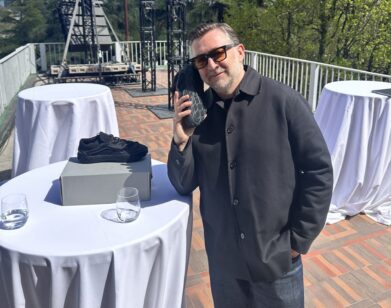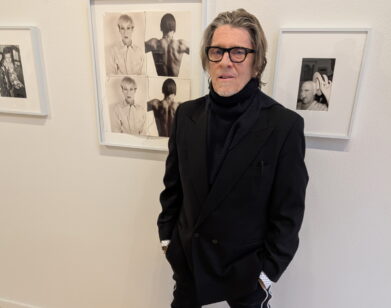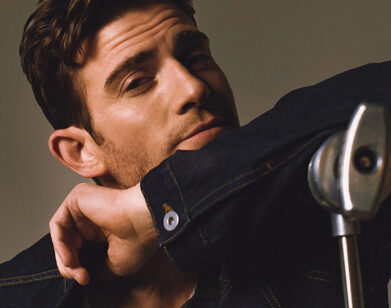Ari Millen
ARI MILLEN AT THE GRAMERCY PARK HOTEL IN NEW YORK, MARCH 2015. PHOTOS: HAO ZENG. STYLING: JESSI JACQ. GROOMING: LORI HAMLIN PENSKE FOR EXCLUSIVE ARTISTS MANAGEMENT.
BBC America’s Orphan Black works because of Tatiana Maslany‘s immense acting ability. Thus far, Maslany has played nine characters, all of which are clones. Each clone that the Canadian actress portrays—from the British feisty former bad girl Sarah Manning to the type-A soccer mom Allison Hendrix—feels like an individual, with her own cadence, body language, and priorities. It is hard to believe that when Maslany shoots scenes, she is often acting at a tennis ball or a mark on the wall. Her performances elevate the show beyond its sci-fi premise: it’s not a clone drama; it’s a character drama.
For the third season, which debuts this weekend, Orphan Black‘s showrunners are taking a big risk. Sarah and her sisters are no longer the only clones on the show; they have male counterparts, collectively know as “Project Castor.” Raised by and for the military, the Castor clones have always been aware of their odd origins. Project Castor’s face is not an unfamiliar one; the audience has unwittingly been following one of them throughout the second season, Mark Rollins.
Played by 32-year-old actor Ari Millen, Rollins is one of the most unsettling characters on a show filled with unsettling characters. He began Season Two as a devoted member of an anti-clone cult named the Proletheans. By the end of the season, however, he has absconded with Gracie, the eldest (though still not old enough) daughter of the Proletheans’ leader. Now that we know he’s one of many, his whole history has shifted: was he infiltrating the Proletheans as part of a mission for the Castor clones? And if so, is he on the run from both his band of brothers and Gracie’s family?
The success of the show now rests on Ari Millen’s performance and his ability to match Maslany. So far, the Kingston, Ontario-native has not disappointed.
EMMA BROWN: I heard that the showrunners had originally intended to kill Mark off after a couple of episodes. Is that true?
ARI MILLEN: Yeah. I knew that it was a recurring role when I got cast. I didn’t know how many episodes, but I soon learned it was going to be six episodes. On my first day there, [Orphan Black co-creator] John Fawcett introduced me to Dylan [Bruce], who had just flown in, and John said, “This is the guy that’s going to kill you.” I guess they had a bad experience in the first season with not telling someone they were going to die, so they were like, “We’ve learned our lesson. You know you’re going to die, so there are no surprises.” But the surprise was that I didn’t die.
BROWN: Did they tell you how Mark was going to die?
MILLEN: No, but I was expecting and hoping for a death fit for Orphan Black. They do deaths really well on the show.
BROWN: When did you find out that Mark was going to survive?
MILLEN: I read Episode Six, and I wasn’t dead. Then I kept reading the scripts and I wasn’t dead, I wasn’t dead, I wasn’t dead. We were partway through filming Episode Nine, and I got a phone call from [co-creator] Graeme Manson, and he told me what their plans were.
BROWN: Did they always intend to introduce male clones?
MILLEN: I think so. That was always part of the story, they just didn’t know who it was going to be and in what capacity. I’m lucky it was me.
BROWN: It’s probably a good thing that you didn’t know that beforehand.
MILLEN: Had I known, I would have played Mark differently—I would have been playing the end. But it was a lot more interesting for this season. I played him a completely different way last year and then I got to explore him again this year knowing what I didn’t know last season.
BROWN: Mark was always quite a mysterious character. Did you create a back story for him when you were filming Season Two?
MILLEN: Yes, I did. And for the most part it kind of fit with what I learned about him later. I saw him as a lost soul, someone who was always searching for family. When he found [Gracie’s father] Johansson and the Proletheans and they took him in, he discovered what he was always looking for and found purpose and was willing to do whatever was asked of him to maintain that. [Then] obviously he fell in love with Gracie and saw his future. That’s how I saw who he was, and I was able to incorporate that story into the third season once I learned that he was a clone and self-aware and had these brothers. It worked out really well.
BROWN: Did they give you any indication of how many clones you’d be playing this season?
MILLEN: At the end of last season, I only knew of two more: Rudy and Miller. But I didn’t know the names; I didn’t even know who they were. I just had the visuals of who they were. I don’t think [the writers] even really knew—they hadn’t fleshed them out. Stephen [Lynch] and Sandy [Sokolowski]—the key hair and makeup team on the show—gave them these strong visuals to work with and they were able to brainstorm and extrapolate from there. The scar and the mohawk for Rudy. Miller was just very military—they knew they wanted the military to have taken over the clone program, so that was a very strong visual. They put Miller in fatigues. This season we’ve gone further with the characterization.
BROWN: I know sometimes when you’re doing scenes in which you are playing multiple characters, you have a scene partner you act opposite. You already knew your scene partner, right?
MILLEN: My clone double? Yeah, Nick Abraham. He and I went to Ryerson University’s Theatre School together, so that was very nice for me because we didn’t have to break the ice.
BROWN: Did you suggest him or was it pure chance?
MILLEN: I asked for him to get the audition and thankfully he looked the most like me of all the people who auditioned and also did the best job.
BROWN: What was your audition for the show like?
MILLEN: Orphan Black tends to, for their auditions, shroud it in secrecy and change names. I think one of the scenes I auditioned with wasn’t even going to be in the season. Two of the scenes I auditioned with were the opening diner scene in the beginning of Season Two and the scene with Paul at the bar in Episode 206. The names were all changed, but I’d seen the season before and I was a big fan. When I came in, one of the producers, MacKenzie [Donaldson], was in the room, and I was like, “Is this person this person? And is this person that person?” Of course she was like, “I’m not allowed to confirm, but you’re on the right track.” [But] thankfully, I knew who I was talking to. I did the audition and she said, “John Fawcett is 10 minutes away. Do you mind waiting and doing it [for him]?” At that point I knew, “Well, that’s good news. That sounds promising.” So I went back into the waiting room and sweated bullets and got really nervous and then John came in and I did it again.
BROWN: Do you come from an artistic family?
MILLEN: Yeah. My mum was a dancer when she was a kid. Then my parents met and eventually had an art gallery; my dad taught himself how to frame pictures and then he was a curator at an art gallery in the city I’m from. I’m an only child.
BROWN: Did you watch a lot of movies growing up?
MILLEN: Oh, yeah. They knew me by name at the local video rental place.
BROWN: What were some of the films you used to watch over and over again as a child?
MILLEN: Probably Wayne’s World and Ace Ventura. I had those on VHS and probably wore them out.
BROWN: Were you interested in being a comedic actor when you started out?
MILLEN: I don’t know. It doesn’t come easily to me, comedy. It’s definitely not my strong suit. I’m probably more suited for drama and dramatic roles, but I certainly would love to be in quirky and fun movies.
BROWN: Why do you think you’re more suited for drama?
MILLEN: I think comedy is one of the hardest things to pull off. You either have timing or you don’t, and that’s something I don’t have for sure.
BROWN: Which of the clones has been the easiest to inhabit thus far?
MILLEN: Probably Mark, ’cause I know him the most. But for the most part, each clone inhabits a certain part of my personality. In the case of Rudy, he’s probably the least like me, but his peacock nature and his outgoingness is maybe something I’ve always wished I had more of, so getting to play him was almost an excuse to push myself into a place where I was uncomfortable. I got to explore and have fun. Normally I might be judging myself, “You can’t be like that. You’re not allowed to be like that.” So it was kind of fun.
BROWN: I know Tatiana has playlists for each of the characters she plays. Do you have anything like that?
MILLEN: No. Music wasn’t my in. I needed to see myself in the mirror. That’s how I met two of the characters—before they even said a word, I had the mohawk, I had the scar, I had the fatigues. That’s where I started with these guys; that was where I was building them from and thinking about them from. I would go in in the morning, put my wardrobe on, then go into hair and makeup and see the transformation: “Okay, this is who I am right now.”
BROWN: Did they tell you how Rudy got his scars? How much information do they withhold from you?
MILLEN: They’re military, so most of those things are probably military. I’m going to go with that. These guys are highly trained soldiers. They’ve been in deep behind enemy lines, and sometimes they get hurt.
SEASON THREE OF ORPHAN BLACK PREMIERES THIS SATURDAY, APRIL 18 ON BBC AMERICA.

